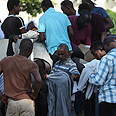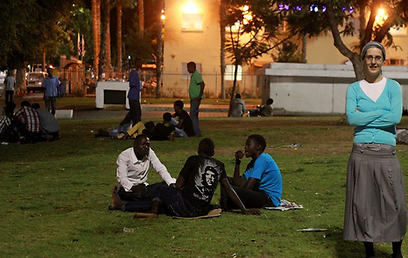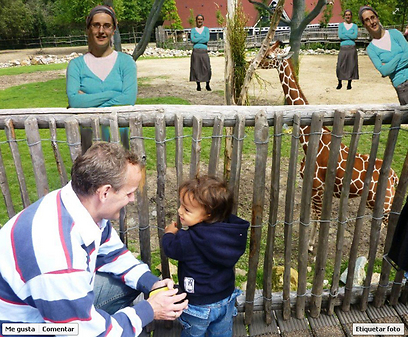
Woman calls Africans 'animals' on Facebook
Ayala Ben Naftali attacked by thousands on social network after posting photo album containing racist remarks against refugees residing in south Tel Aviv. 'If a man had posted the same picture, he would have been completely ignored,' she states
On Thursday, Ayala Ben Naftali uploaded a photo album titled "Night tour of the south Tel Aviv safari". One of the pictures, in which she is seen posing against the backdrop of a number of African refugees sitting in a park, was accompanied by the following racist caption:
"There are no signs saying you can't take pictures with the animals. There were no signs forbidding feeding either, but we decided to pass on that."

(Photo: Yehudit Amrusi)
Throughout the weekend, while Ben Naftali was observing Shabbat, the picture received thousands of comments and shares, as well quite a few satirical memes.

Dan Cooper
On the other hand, Ben Naftali received the support of many Facebook users who sent her hundreds of private messages and even opened a group called, "We all support Ayala Ben Naftali," which currently has 500 members.
"The leftist Israel haters have launched a hatred and incitement campaign against Ayala Ben Naftali, who spoke out against the invaders from Sudan who are stealing our border and raping our women. 'Like' us," the group creator states.
A counter-group, "We're all against Ayala Ben Naftali," was opened in response and currently has 270 members.
"In the Israeli society in general, and in the society referring to itself as liberal in particular, there is a primeval fear of a strong woman expressing a resolved opinion that does not fit 'the right set of opinions,'" Ben Naftali explained in response to the virtual attack she was subject to.
'Please die'
On Saturday night, Ben Naftali responded to the angry comments and attacks on her Facebook page: "On Thursday I posted on Facebook a picture describing the grim situation in south Tel Aviv, where infiltrators have taken over a playground intended for the city's children and turned it into a fourth world, in which not just children – but adults too – cannot walk around and feel like they're in their own country.
"When I opened my Facebook on Saturday evening, I found out that I had received thousands of personal messages and comments – most of which were divided between death threats, rude misogynous reactions which included calls for rape by a group of Sudanese, and wishes that all religious and Jewish people would burn to death.
"I was pleased to learn that the bleeding heart public is so elated and excited about the infiltrators, and not as indifferent as I had thought. Those agitated reactors were not interested in the issue when groups of infiltrators raped Israeli girls – and moreover, those same reactors wish the same fate upon me, if not worse – but I am glad to have raised public awareness to this issue.
"I invite everyone to visit the Lewinsky Park area near the central bus station and be shocked by the situation."
Following the row her pictures stirred on the social network, Ben Naftali chose to block the photo album to people who are not friends with her and added a screen shot of some of the spiteful comments she received.

'It's because I am a woman'
"The multitude of hateful reactions stems from one reason only: The fact that I am a woman," she told Ynet on Sunday. "The proof is the high percentage of offensive comments referring to my womanhood, and the objectification of my body in rude Photoshopped pictures distributed by left-wing activists in a bid to disrespect me as a woman, a Jew and a religious person."
In retrospect, and following the many reactions, would you change the wording you chose to use?
"I stand behind the messages in the pictures, even if the messages hurt a certain political faction which chooses to ignore reality on the ground. The picture itself was not radical, and neither was the caption.
"Labels like 'Little Africa' and 'safari' are common not just on the Web but in the public discourse as well, in the media and even in the Knesset. Clearly, if a man had posted a critical photo against the infiltrators, he would have been completely ignored."










